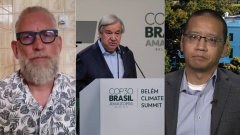This is a rush transcript. Copy may not be in its final form.
AMY GOODMAN: This is Democracy Now!, democracynow.org, The War and Peace Report. I’m Amy Goodman.
Global negotiations at the U.N. climate summit ended Saturday in Belém, Brazil, with a watered-down agreement that doesn’t include a roadmap to phase out fossil fuels, oil, gas and coal — doesn’t even mention fossil fuels, the world’s largest contributors to the climate crisis. The final agreement went into overtime after two weeks of contentious negotiations in Belém, the gateway to the Amazon.
A coalition of more than 80 nations, from Latin America, Asia, Africa, the Pacific, Europe and U.K., had supported a just transition away from fossil fuels, but the efforts were derailed by petrostates, including Saudi Arabia, the United Arab Emirates and Russia, as well as the more than 1,600 fossil fuel lobbyists who were granted access to the climate talks this year. A fossil fuel phaseout was also a key demand by the thousands of Indigenous leaders who attended COP30.
This is Colombia’s environment minister, Irene Vélez Torres.
IRENE VÉLEZ TORRES: Particularly the oil-producing countries are only trying to focus on adaptation. But adaptation is an empty bag if mitigation doesn’t come next to adaptation. Adaptation alone and the finances for adaptation are not sufficient if we don’t deal with the problem.
The root cause of this problem is fossil fuels. How are we dealing with that? How are we going to come out from this COP to say and to tell the people that we deny the most basic scientific truth, which is that the fossil fuels are the cause of more than 80% of the emissions that are generating climate change? We cannot look at the people in the future generations if we don’t do something now. And we cannot accept a text that is not dealing with the real problems.
AMY GOODMAN: While in Belém, the governments of Colombia and the Netherlands announced they’d be co-hosting the first international conference on the just transition away from fossil fuels next year in Colombia. The landmark gathering will take place in the Colombian port city of Santa Marta in April.
The COP30 agreement also makes no new commitments to halt deforestation and doesn’t address global meat consumption, another major driver of global heating. More than 300 agribusiness lobbyists attended the climate talks in Belém as the expansion of industrial agriculture, including the production of soy, has led to worsening air pollution and deforestation in the Amazon.
This all comes as the Trump administration boycotted COP30 after the White House withdrew the U.S. from the Paris Climate Agreement for the second time when Trump returned to office.
We’re now joined by two guests. In Belém, Brazil, Jonathan Watts is with us, The Guardian’s global environment writer, usually based in Altamira, Brazil. And in Washington, D.C., Brandon Wu is the director of policy and campaigns at ActionAid USA, just returned from COP30 in Belém.
We welcome you both to Democracy Now! Jonathan, let’s begin with you. You’re right there in the gateway to the Amazon. You had a major piece with other Guardian writers summarizing what happened. Why don’t you do it for us here? What took place over these last two weeks? What agreement did it lead to? What didn’t it agree to? Would you call it a total failure or an incremental, very slow transition away — though they wouldn’t talk about transition away — from what some call the F-word, fossil fuels?
JONATHAN WATTS: The first thing I would say is that it’s not as bad as I expected. I had the lowest of expectations, which were almost realized. This COP conference came perilously close to breaking down. And if this had broken down, then the whole Paris Agreement, that’s put in place 10 years ago, could have collapsed. So this was a very dangerous moment.
And I don’t think we can understand what happened in Belém without looking at the terrible, terrible geopolitical situation. The absence of the United States was critical. The United States, of course, is the world’s biggest historical emitter and the richest country, the one that in past conferences has leaned on countries like Saudi Arabia to be a bit more giving. It wasn’t there, and President Donald Trump has been openly hostile to the whole multilateral, global environmental governance system. Then you have the wars. Then you have the fact that Europe is rearming. So, in this context, I think it’s amazing that anything came out of this.
Your summary is excellent, that this conference didn’t go — get anywhere near close enough to where we need to be going to keep global warming to a reasonably safe level of 1.5 C. All the scientists I talked to here — and that was something new about this conference, bringing in more scientists, as well as more Indigenous people — all the scientists here were incredibly alarmed. We’re approaching a number of tipping points with regards to the Amazon rainforest, with regards to Atlantic currents and so forth. So, yes, that’s frustrating, but that’s not new. Last year was a very similar outcome. This year, what I think there was — it’s really disappointing there was no mention of fossil fuels. But Saudi Arabia just said really clearly, if you talk about a roadmap and transition, these talks are going to collapse. So, it just wasn’t on the table.
But what we did see was the start of a new just transition mechanism, a tripling of funds, adaptation funds, for developing countries, and, more than anything else, a kind of a radicalism that’s come into the talks that wasn’t there before. It was there on the streets. For the first time in four years, civil society was out in force, amazing color, dynamism, flotillas in the bay, tens of thousands of people in the streets, more Indigenous people in the conference than ever before. That was incredibly encouraging. So was the fact that, as you mentioned, Colombia and a group of other high ambition nations have decided to go it alone and create a parallel series of conferences for a just transition away from fossil fuels. That’s really going on the offensive.
And then, finally, kind of in the background of all of this was China and what’s happening in China with its fossil fuel shift away — sorry, a shift away from fossil fuels, incredibly, incredible ramp up of wind, solar, electric cars, that is transforming the world. Despite what the talks do achieve or don’t achieve, it’s absolutely incredible how fast things are moving in that area. So, it seems, from where I’m sitting, that the United States under Donald Trump is trying to go backwards to the 20th century in a fossil fuel era, whereas a huge part of the rest of the world wants to move forward into something else. So, yes, I wish there was much, much more on the table here, but given everything that’s happening in the world right now, the whole process lives to fight another day.
AMY GOODMAN: You talk about the role of China. I want to bring in Brandon Wu. China and the United States. You’ve just returned from Belém, flew in to Washington, D.C. If you can talk about the significance of the U.S.? So, you don’t say the U.S. and Saudi Arabia and UAE and other countries blocked the final declaration mentioning fossil fuels, but that’s only because the U.S. boycotted. So, the significance of this? And did you expect that China would more fill the vacuum, as it becomes a leader in the production of renewable energy technology?
BRANDON WU: Yeah, China’s role in this, in all this, is extremely interesting. You know, let’s talk about that.
I actually want to back up a moment and say I’m extremely angry, right? I’m angry at a really weak outcome. I’m angry at the fossil fuel lobbyists roaming the venue freely, while the Indigenous activists, that both of you have mentioned, were actually met with militarized repression. I’m angry at all the governments that aren’t standing up for their people.
But I have a special level of incandescent outrage at a particular set of countries, and it’s actually a slightly different set than the one that we’re naming so far, and that is the rich, developed countries of the Global North, who come in to these conferences, and they act like they’re the heroes, when, in fact, what they’re doing is shifting the burden of a crisis that they caused onto the backs of the poor.
So, you have — of course, you have the United States, but also the European Union, which was part of this so-calle





